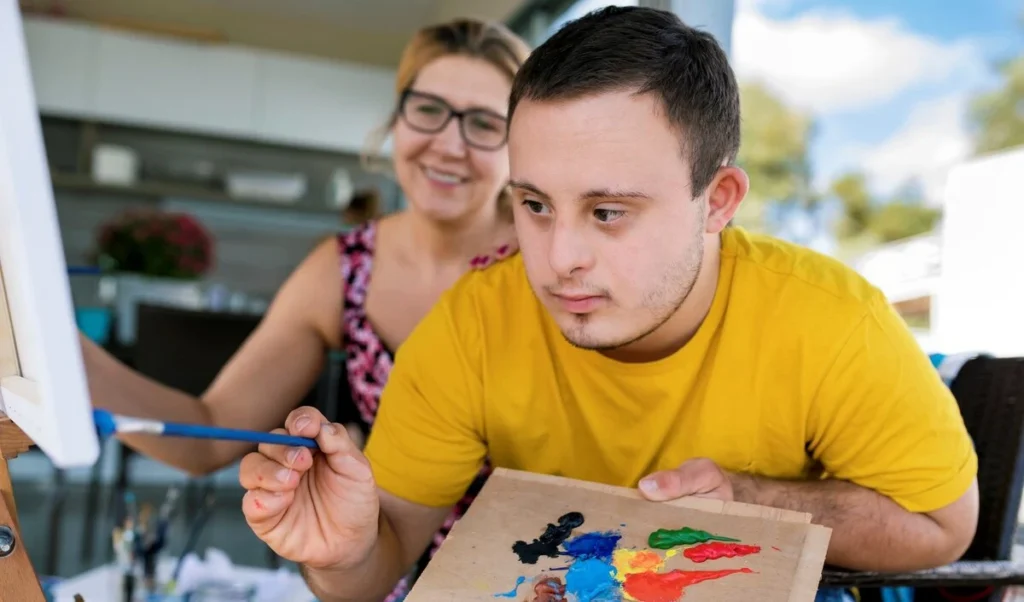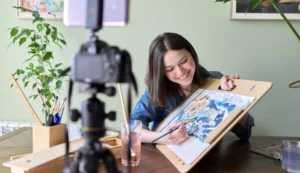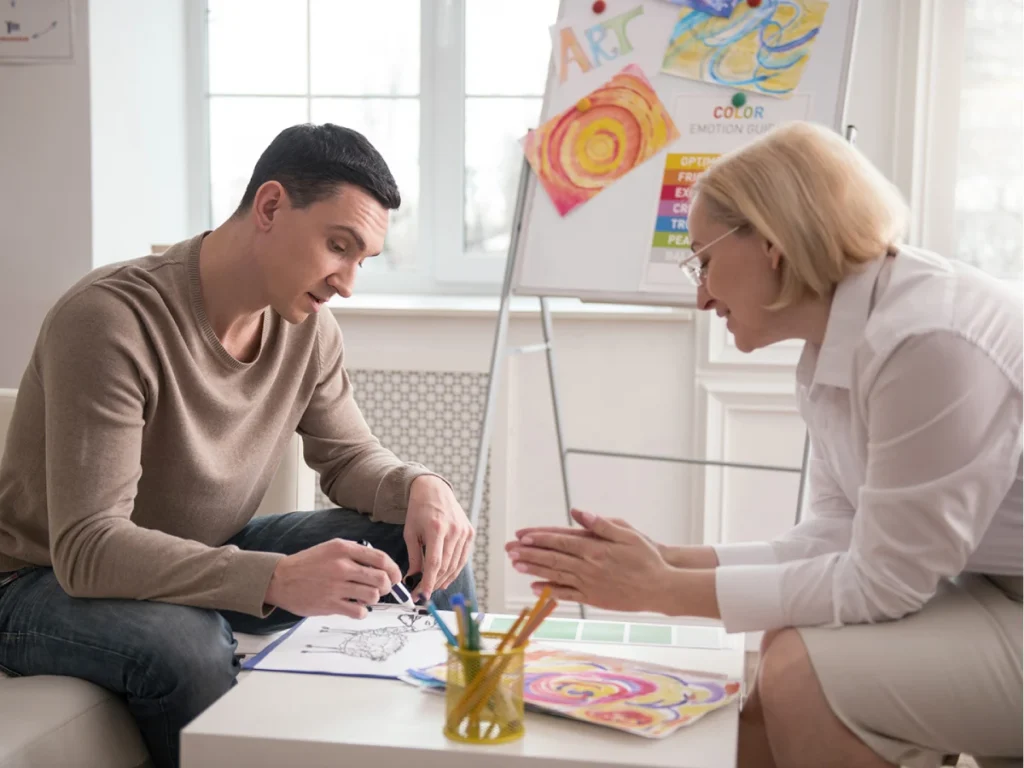Have you ever felt like words just aren’t enough to express how you’re feeling? Maybe you’re struggling with emotions that are too complex to put into sentences, or perhaps talking about your feelings seems overwhelming. What if you could paint, dance, or play music to help you heal instead? This is where Expressive Arts Therapy comes into play, offering a creative and profound way to explore your emotions and experiences.
So, whether you’re dealing with stress, anxiety, or just looking for a new way to grow personally, expressive arts therapy might just be what you need. Let’s uncover how creativity can be your gateway to healing and transformation.
Contents
What is Expressive Arts Therapy?
 Expressive Arts Therapy is a dynamic and multifaceted therapeutic approach that integrates various forms of creative expression to promote healing and personal growth. Unlike traditional talk therapy, this method encourages individuals to explore and express their feelings through visual arts, music, dance, drama, and creative writing. The idea is not just to create art but to use art as a language of emotional depth and personal insight.
Expressive Arts Therapy is a dynamic and multifaceted therapeutic approach that integrates various forms of creative expression to promote healing and personal growth. Unlike traditional talk therapy, this method encourages individuals to explore and express their feelings through visual arts, music, dance, drama, and creative writing. The idea is not just to create art but to use art as a language of emotional depth and personal insight.
At its core, Expressive Therapy is based on the belief that the process of creating art can be inherently therapeutic. This therapy doesn’t focus on artistic talent or the final product, but rather on the process of expression itself. By engaging in artistic activities, individuals can uncover and work through deep-seated emotions, conflicts, and memories in a non-verbal way. It provides a safe outlet for expression that might be difficult to articulate with words alone.
Whether addressing psychological issues, emotional disturbances, or simply aiming for personal development, Expressive Arts Therapy offers a unique and impactful route to explore and enhance mental health.
How Expressive Arts Therapy Works

Expressive Arts Therapy operates on the principle that everyone has the capacity for creative expression and that this creativity can be harnessed for personal healing and growth. Here’s a simple breakdown of how this therapy works:
Using Art for Self-Expression
At the heart of this therapy is the use of art-making to explore personal feelings and experiences. This process isn’t about creating a perfect piece of art but about letting out what’s inside you in a tangible form. For example, you might draw or paint your emotions, write a poem about a difficult experience, or express your feelings through dance.
Exploration of Emotions and Experiences
A therapist might ask you to describe your artwork, explore the emotions that surfaced while making it, and discuss any memories or thoughts it brings up. This helps to bring unconscious feelings to the surface, making it easier to understand and work through them.
Facilitating Difficult Expressions
Many times, people find it challenging to talk about painful or complex emotions. Expressive Arts Therapy provides an alternative by allowing these feelings to be expressed through creative work.
Enhancing Self-Discovery
Through engaging in different forms of artistic expression, you can begin to see patterns, recognize emotional triggers, and understand deeper aspects of your personality and life experiences. Each creative process you engage in offers a new lens through which to view yourself and your relationships, fostering deeper self-knowledge and insight.
Who Can Benefit from Expressive Arts Therapy?
Yes, Expressive Arts Therapy is beneficial for both adults and children, providing valuable support for a variety of conditions. Here are some specific issues that this therapy can help address:
- Anxiety
- Depression
- ADHD
- Stress
- Trauma
- Emotional Regulation Difficulties
- Behavioral Issues
- PTSD
Expressive Therapy is a flexible and adaptive therapeutic approach that can be tailored to meet the unique needs of each individual, making it a powerful tool for a wide range of psychological and emotional issues.
Techniques Used in Expressive Arts Therapy
 Expressive Arts Therapy uses various creative activities to help people express themselves and work through their emotions. Here’s a look at some common techniques used and how they help during therapy sessions:
Expressive Arts Therapy uses various creative activities to help people express themselves and work through their emotions. Here’s a look at some common techniques used and how they help during therapy sessions:
- Drawing and Painting: This method allows people to visually express emotions, leading to discussions about the artwork that can uncover deeper feelings and insights.
- Sculpting: Clients use materials like clay to shape objects that represent their thoughts or emotional struggles.
- Digital Art: Digital art provides a modern and sometimes easier way to start making art, helping people try new ways of expressing themselves.
- Music Making: Clients might write songs, play instruments, or listen to music that matches their feelings or memories.
- Drama and Role Play: Acting helps people see their own stories from outside themselves, giving new perspectives and helping them understand their emotions better.
- Movement and Dance: Clients move or dance to express feelings without words, using choreographed pieces or free movement.
Each technique in Expressive Arts Therapy offers a unique way to explore personal issues. By using art, clients can find new paths to understanding and healing, beyond what traditional talking therapies can offer.
Benefits of Expressive Arts Therapy
- Reduces stress and anxiety
- Improves mood
- Increases self-esteem
- Enhances emotional regulation
- Aids in trauma recovery
- Helps with depression
- Supports children’s development
- Engages older adults, potentially reducing feelings of loneliness
- Offers accessible ways for individuals with physical or mental disabilities
- Encourages Social Connection
These benefits make expressive arts therapy a valuable tool for addressing a variety of mental health issues and improving overall well-being across diverse populations.
Getting Started with Expressive Arts
If you’re ready to explore how Expressive Therapy can help you, consider reaching out to MantraCare. We offer affordable online counseling with experienced therapists who are trained in a variety of therapeutic techniques, including Expressive Arts Therapy. Whether you’re dealing with anxiety, depression, stress, or any other issue, our therapists can help you work through your challenges in a creative and supportive environment.
Book a trial therapy session with MantraCare today and discover how Expressive Therapy can enhance your journey towards better mental health and well-being.


